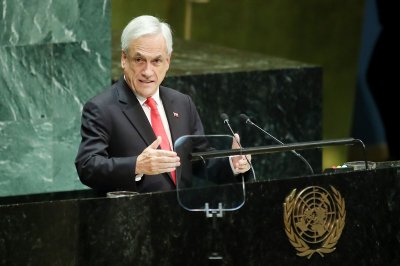Topic: Augusto Pinochet
Augusto José Ramón Pinochet Ugarte (25 November 1915 – 10 December 2006) was a Chilean army general and leader of a military dictatorship that assumed power in a coup d'état on 11 September 1973. Among his titles, he was the Commander-in-Chief of the Chilean army from 1973 to 1998, president of the Government Junta of Chile from 1973 to 1974 and President of the Republic from 1974 until transferring power to a democratically elected president in 1990.
By early 1972, Pinochet was answering to General Chief of Staff of the Army. In 23 August 1973, he was ascended to Commander-in-Chief of the Chilean Army by president Salvador Allende. On 11 September 1973, Pinochet led a coup d'état which overthrew Allende's democratically elected socialist government. In December 1974, the military junta appointed Pinochet as President by a joint decree, with which Air Force General Gustavo Leigh disagreed. From the beginning, the government implemented harsh measures against its political opponents. According to various reports and investigations 1,200–3,200 people were killed, up to 80,000 were interned, and up to 30,000 were tortured by his regime including women and children. The new government also implemented economic reforms, including the privatization of several state-controlled industries and the rollback of many state welfare institutions. These policies produced what has been referred to as the "miracle of Chile", but the government policies dramatically increased economic inequality and some attribute the devastating effect of the 1982 monetary crisis in the Chilean economy precisely to these policies. Pinochet's economic policies were continued and strengthened by successive governments after 1990. Chile is now the best-performing economy in Latin America, though academics continue to dispute the legacy of Pinochet's reforms.
Pinochet's regime was given a legal framework through a highly controversial plebiscite in 1980, which approved a new Constitution drafted by a government-appointed commission. A plebiscite in 1988 (which saw 56% vote against continuing his presidency) led to democratic elections for the Presidency and Parliament. After peacefully stepping down in 1990, Pinochet continued to serve as Commander-in-Chief of the Chilean Army until 10 March 1998, when he retired and became a senator-for-life in accordance with the 1980 Constitution. In 2004, Chilean Judge Juan Guzmán Tapia ruled that Pinochet was medically fit to stand trial and placed him under house arrest. By the time of his death on 10 December 2006, about 300 criminal charges were still pending against him in Chile for numerous human rights violations, tax evasion and embezzlement during his 17-year rule and afterwards. Pinochet was accused of having corruptly amassed a wealth of US$28 million or more.
It uses material from the Wikipedia article "Augusto Pinochet."














